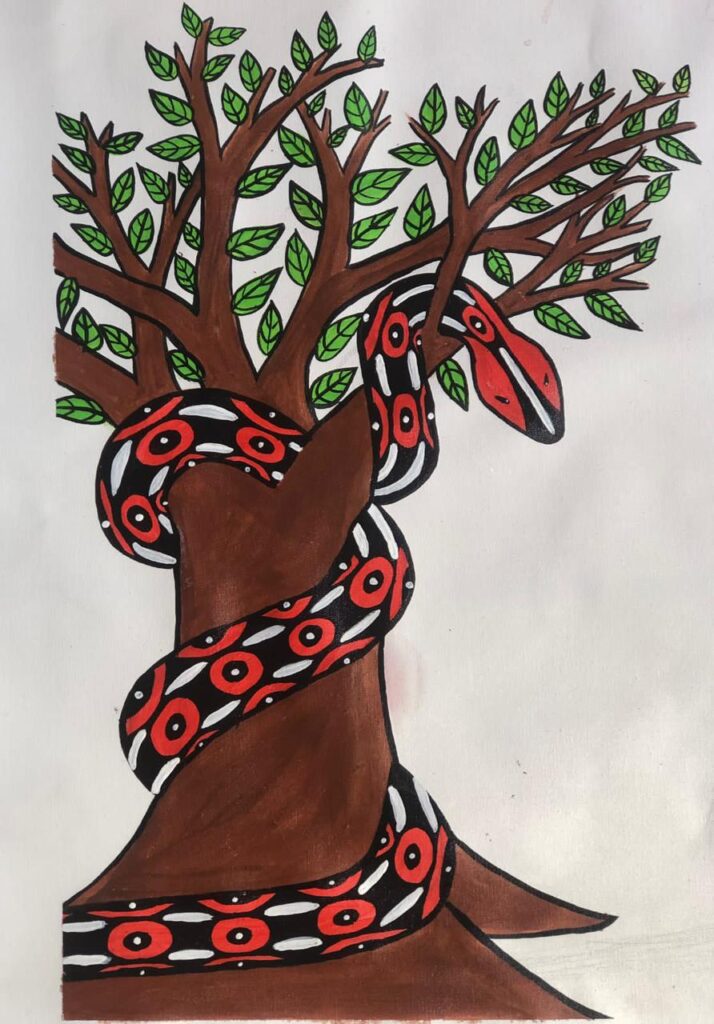
Our University
The University of the Forest has been a centre of wisdom and knowledge for the Huni Kui Indigenous People of Acre since time immemorial. Its physical campus is located between the Indigenous communities of Uskuyá Yuxibúon and Txanayá, on the banks of Rio Envira, one of the affluents of the Amazon river, around 12 hours by boat from the town of Feijó, in Acre, Brazil. The University of the forest serves a population of 16,000 Huni Kui people in more than 100 villages situated along the rivers Envira, Purus, Tarauacá e Jordão.
Founded and governed on customary laws and oral Indigenous traditions, our physical campus is where members of the Huni Kui First Nation have learned to be one with the Amazon biome through our sacred songs, sacred designs, and philosophies and practices of respect, reverence, reciprocity and responsibility towards the forest, rivers, sacred plants and all other beings.
In modern societies, there persists an illusory division between humanity and nature. Yet, for us, this division is non-existent; everything, from the visible to the invisible, is nature—energy governed by Yuxibu, entwined in quantum entanglement. Humans and the forest form a singular entity within this quantum “nature,” rendering violence against the Amazon an assault on the planet’s metabolic body as a whole, and even on our own bodies, as extensions of the earth. We are integral parts of the same metabolism, the same whole. The illusion of separation lies at the root of the current slow-motion mass extinction crisis we face.
The University of the Forest is governed by a Senate of Elders, both human and non-human. The university calendar is organized around seasonal events: times of planting, harvest, dry season, rain season, and specific collective ceremonies. All exams (effective respectful fishing, hunting, planting, harvesting, trading, healing, advocating, singing, composing, designing, painting, building, composting, etc.) must benefit the community and reflect collective collaborative learning and coordination.
Our bylaws are rooted in Indigenous values and customary laws, emphasizing integrity, reciprocity, and accountability to the Forest and all its inhabitants. These principles govern our actions, partnerships, and approach to knowledge production and mobilization.
We are proud of the relational sciences and technologies we have developed over centuries of rigorous research in close collaboration with our multiple partners, including all forest and river organizations of organisms.
The largest and longest serving president of the University of the forest is the Sacred Samauma tree. The senior leadership team also includes the academic provost Sacred Anaconda (sagrada jibóia) and the provost international the Royal Harpy Eagle (sagrado gavião real, which is the symbol of UoF). Each river is a Faculty that is administered by a Dean, who is usually a hereditary chief of one of the communities situated along that river. Each community represents an interdisciplinary department. Our current global ambassador is Chief Ninawa Inu Huni Kui, from the jaguar clan.
The University of the Forest is one of several eco-versities worldwide rooted in Indigenous traditions and customary laws. While our university has primarily served the Huni Kui People for centuries, the urgent global crises of climate instability and biodiversity loss – the climate and nature emergency – have compelled us to recognize our broader responsibility as an institution.
As Indigenous Peoples we have always recognized our interdependence with the land, and as an institution of higher learning we can no longer ignore our global responsibility to collaborate globally to interrupt harmful thinking and practices that are placing humanity on the path of premature extinction.
That is why we decided to build our international digital campus (this website) in close partnership with the Gesturing Towards Decolonial Futures Arts/Research Collective as an immersive artistic and pedagogical experience. While we occasionally invite people to visit the Amazon campus, the purpose of this digital campus initiative is to invite and support people everywhere to intentionally repair their relationship with the whole/with the Earth wherever they are and embrace the responsibilities associated with this reunion.
This virtual campus has 5 inter- and trans-disciplinary Faculties: Respect, Reverence, Reciprocity, Responsibility and Climate Education. Each Faculty has a hub of experiments. Each experiment is a collaborative regenerative inquiry around a matter of concern. Each inquiry has connection points with other inquiries both within each Faculty, between different Faculties and beyond. Our research and education are grounded in a practice/discipline we cal sense-fullness, which is distinct from mindfulness. Sense-fullness asks for a different relationship with our sense of self, identity, belonging, imagination, language, sensory perception, and reasoning. It prepares us to have a relationship with reality that is not necessarily mediated by human constructions of meaning.
For more information about our international strategy, click here.
